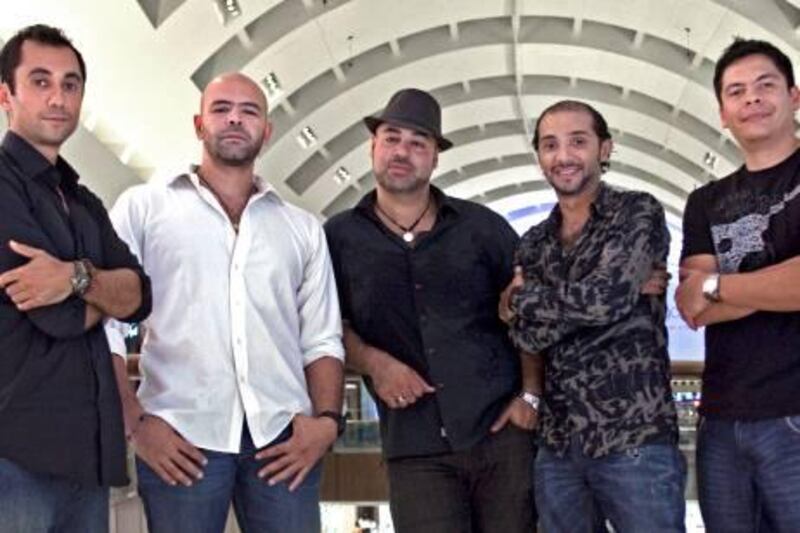It can take a band a few albums before finally nailing its sound.
Not only has the Dubai group Dahab found it with just two records, but the members have gone so far as to coin their own term to define it.
"It's not rock, it's not blues or jazz, and world music has such a huge scope," says the guitarist Sharif Maghrabi. "We wanted to narrow it down a bit and so we called it acoustic-ethnic-fusion."
Indeed, when asked to expand further on the band's musical blend, Maghrabi quips that it's "like the soundtrack to Lawrence of Arabia". And while there might be a touch of mischief to his description, Maghrabi is not actually that far off.
The group, consisting of the core trio, including the singer and guitarist Majid Fassi and the percussionist Adham Sharkawy - and often extended to a five-piece group when performing live - compose acoustically driven cinematic songs evoking epic landscapes.
If you listen to Dahab's new album Qabeela'h (Tribe) with a pair of good headphones and eyes closed, you might recall the scene from Lawrence where a young Peter O'Toole charges down the Nefud Desert.
But in musical terms, Dahab is similar to Tinariwen. Like the highly acclaimed Mali desert collective, Dahab's music is heavily inspired by isolated locations that are a far cry from Dubai's skyscrapers. Named after the Bedouin fishing village in the Sinai Peninsula, Dahab evokes the region's rich musical heritage, infusing elements of Egyptian instrumentation over languid compositions.
Dahab's songs, which mix instrumental with vocals in English, do not gallop so much as unfurl. One can picture the idyllic coastal settings the songs were composed in.
It was also in Dahab that the group formed. Maghrabi and Fassi first met in 1996 while holidaying in the city and discussed musical interests. However, it was when they ran into each other again in 2004, this time in the lift of the MBC Dubai studios where they both happened to work, that they decided to put their musical talents together.
After recruiting Sharkawy, who was a regular in Dubai's drumming circles, the group initially began playing jazz and rock covers before focusing on writing their own songs.
Maghrabi says the band recorded Qabeela'h in a similar manner to their debut, The Spirit of Sinai (2009).
After coming up with a bunch of song ideas from their weekly Dubai jamming sessions, the trio would take these musical scraps and travel to Dahab for a week where they would live in straw huts by the beach and flesh out the songs before going to a Cairo studio to record the album.
Maghrabi says travelling to Dahab is essential as it is the only way to retain the group's distinctive vibe.
"The atmosphere and spirit of the Sinai are evident in the music. The place has very sacred history from a mythological, religious, tribal and historical standpoint," he says.
"I think if I wrote a song in a big city like Dubai it would come off anxious and apprehensive. If I wrote one sitting on top of a mountain, watching the sun rise, it would be different."
But despite the relaxed nature of the recordings, the band organise these "songwriting trips" with businesslike precision in order to fit in with their family commitments and day jobs.
Each two-week trip is planned a year in advance, with one week spent finessing songs and the second week in the studio for recording.
Maghrabi says the band's decision to record in Cairo was made, not only because it was cheaper, but it also allowed them to make use of the city's musical guns-for-hire.
"They are really some of the best musicians in the world," he beams. "We were able to draw upon local session musicians in the recording of the albums, like somebody who plays the nai, which is like an Arabic wind-flute and a violinist. The drummer and bassists were also session musicians. Their musicianship is a very important factor."
However, it is back in the UAE where the real work will now begin for Dahab.
While their two albums were financed by the group's members themselves, it is only Qabeela'hthat made it as far as a physical release. Spirit of the Sinai was made available free online (and now can be listened to fully on the band's MySpace page) and physical copies were only available at their live shows.
However, it was the reception given to the band's live performances that saw their reputation grow, with performances in 2009's Beats on the Beach as well as the Cairo Jazz Club.
With Qabeela'h now available in Virgin Megastores (though not yet in the acoustic-ethnic-fusion section) the band's members view the release as their debut and they plan to hit the ground running.
Dahab will return to play in Abu Dhabi's Corniche on November 10 as part of this year's Beats on the Beach and are talking to various venues about residencies.
"We definitely plan to work hard and we do have a business plan," Maghrabi says. "We've also planned our next trip to Dahab for next year; we already have 18 new songs."
Qabeela'ah is out now. For details, visit www.dahabband.com.











